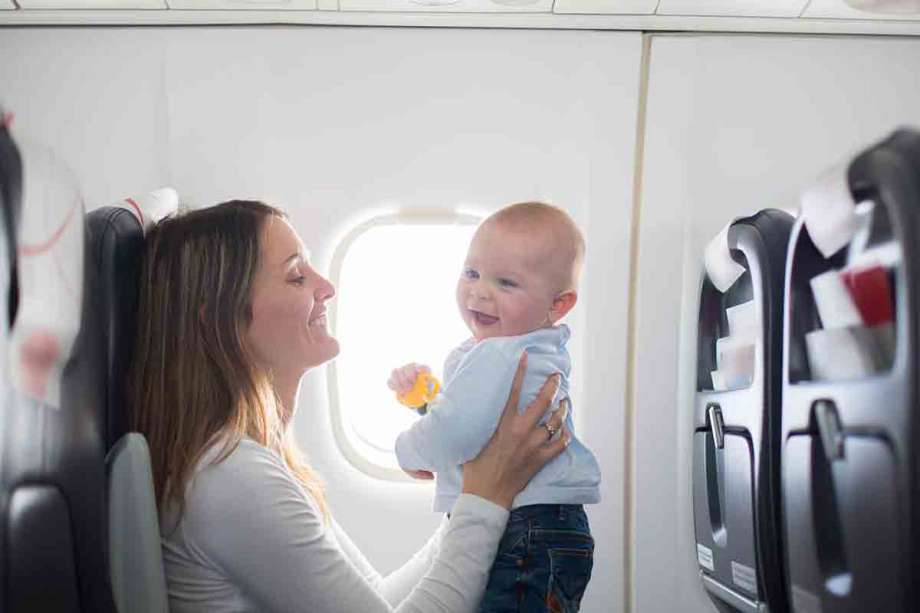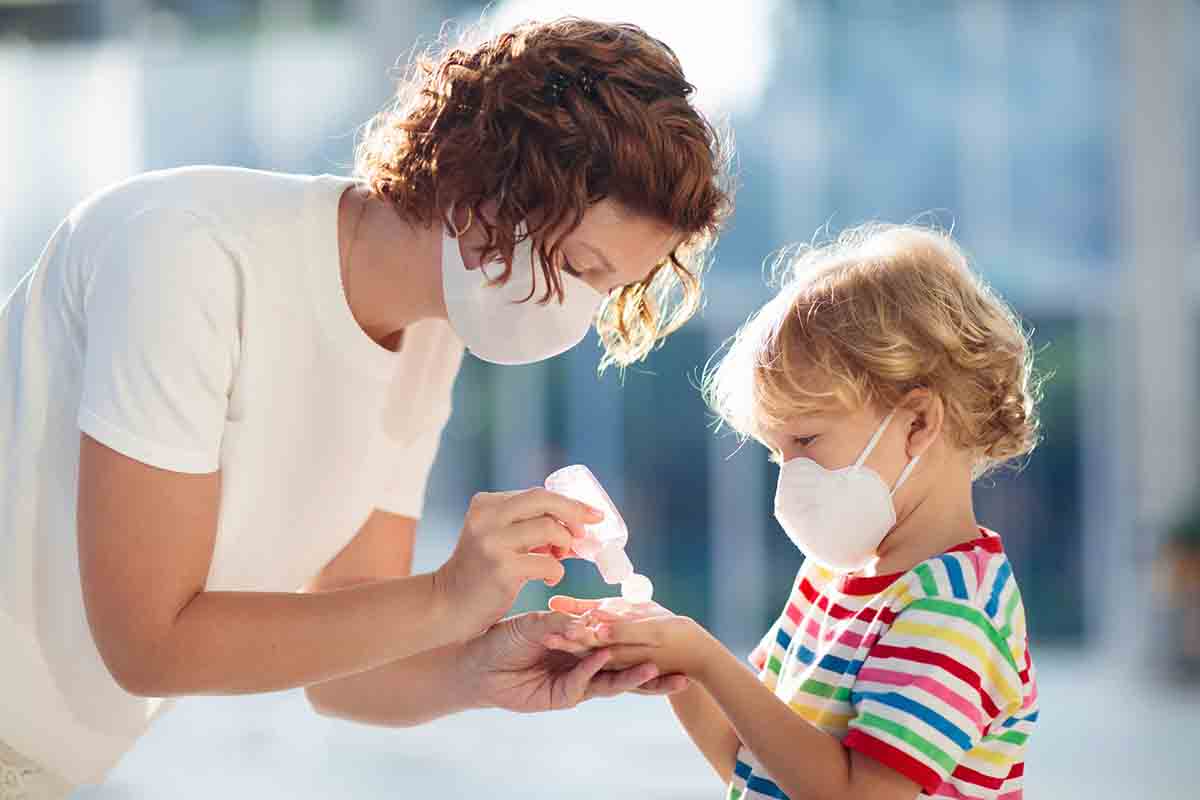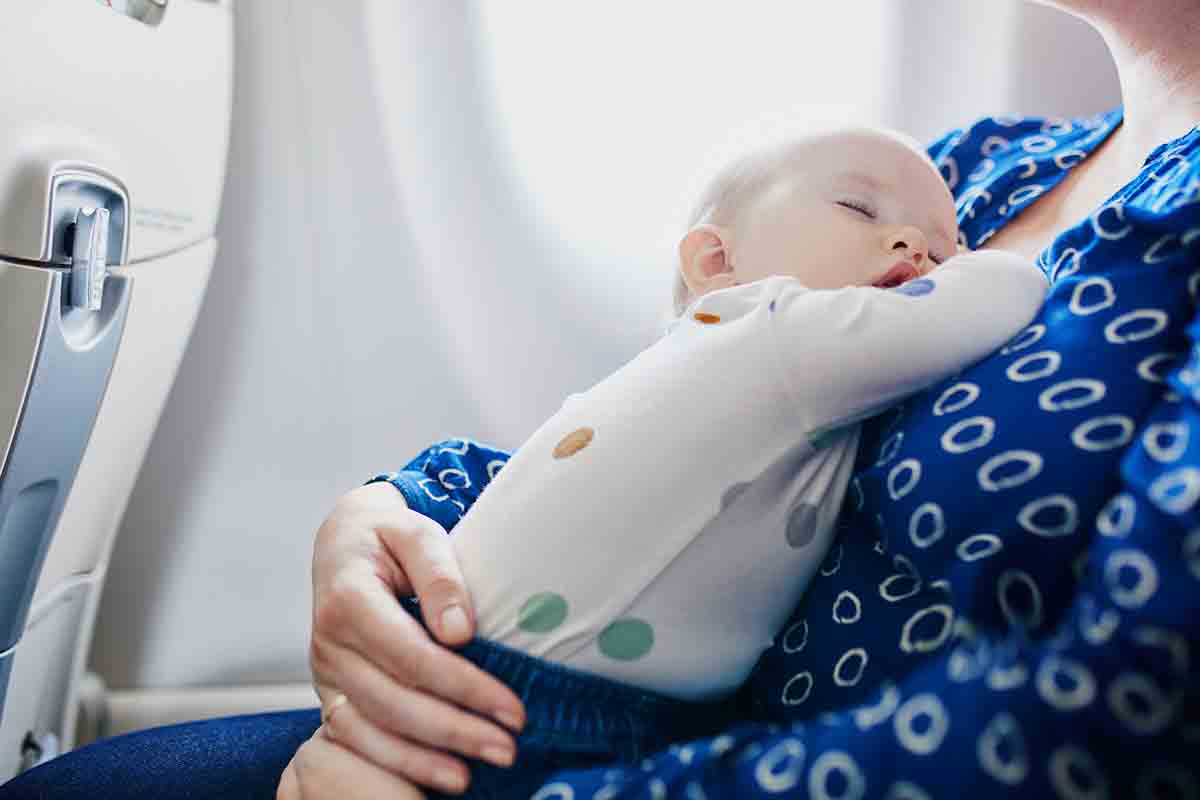When Are Babies Old Enough to Fly on Planes?

How old should my infant be before I take him on an airplane? I am due in November and would like to visit family for the holidays.
Assuming that both mother and baby are healthy, you can travel when your infant is two weeks of age. In some cases, you can fly even sooner than that, but I would recommend holding off if it's not absolutely necessary.
When you have a newborn and have the itch to travel, you may be wondering when the right time is to bring them on board. There can be all types of concerns from feedings to exposing babies to potential illnesses. Parents these days have even more concerns about air travel with babies since the coronavirus began.
We're going to take a look at some common concerns many new parents have when deciding when their newborn should become a first-time flier as well as some helpful travel tips.
Rules for Traveling with Newborns on Planes
The TSA does not have a standard rule for when newborns can fly on planes. While it is under the parent's discretion, airline policies vary for how old babies have to be. Many require babies to be at least one week old unless there is a note from the pediatrician. Many pediatricians will not recommend air travel for babies until they are 3-6 months old.
Babies are allowed to sit on a parent's lap and do not require their own airplane seat under two years of age. Some airline policies do charge a fee for international travel even when a seat is not purchased for a baby. It's best to check with your carrier for specific rules.
Some parents choose to buy their baby their own seat, especially for long flights. This allows for the baby to be in an FAA-approved car seat or airplane harness device installed with the airplane's seat belt. Booster seats cannot be used on airplanes.
For international flights, plan on having a passport for your infant. The TSA does not require identification for children under two for domestic flights. But it is a good idea to bring your baby's birth certificate just in case there are any questions about age or identification.
Illness and Air Travel with Babies
First, you are exposing the baby to possible infections on a crowded airplane. Colds and the flu are transmitted easily in a closed airplane cabin with recirculated air, and those viruses are much more dangerous to a baby at a week or two of age than one who is four or six months old.
Breastfeeding transfers many protective antibodies to a baby, however, and may help make her less susceptible to infections.
If your baby is showing any signs of illness, you should avoid any air travel until their immune system gets stronger. You'll also want to make sure your baby is up to date on their vaccinations before traveling internationally. You can check the requirements and ask your pediatricians.
COVID-19 and Flying with Your Baby

With the introduction of vaccines for COVID-19, family travel is making a comeback for many, even those with newborns. But some parents are still concerned about whether it's safe to fly with a new baby.
The decision is going to depend on your comfort level. As of this writing, COVID vaccines for babies have not been approved which makes some parents afraid to travel with a new baby.
If you must fly with a baby, the American Academy of Pediatrics recommends looking for direct flights that will limit the need to walk through busy airports and change planes. Also, look for destinations that have a shorter flight. You'll also want to bring along plenty of disinfectant wipes to clean any high-touch areas. We all know babies love to touch things and put their hands in their mouths.
Despite taking cleaning precautions and aiming for shorter flights, if flying with a baby during the pandemic doesn't make you totally comfortable, opt for a trip that can be taken by car. This way you're not sharing space with strangers and have more control over the situation.
Managing Your Baby's Crying and Schedule While Flying
Babies are notoriously unpredictable in the first few weeks, with irregular sleeping, feeding, and crying times. While this can certainly be managed, it may be very draining to mom and dad to travel before a baby has "settled." Some babies do this by two weeks, others not until three months. You're going to have to be the judge of when you think your baby has settled.
Even when your baby seems to be in a routine, getting on a plane can bring out the worst in them. We've all heard stories about airline passengers yelling at crying babies. While you can't control when your baby is going to have an outburst or start crying, you can make sure they have plenty of food and something to soothe them. Pacifiers or a "lovey" never hurt and can help little ones get some needed Zen while on a plane. Be sure to pack more than one pacifier in your diaper bag and have some options when it comes to toys and soothers. Babies can get bored quickly, so anything "new" can help.
Mom's Well-Being While Flying
Mom should be healthy and recovered from the delivery before attempting family travel with a newborn. Women are at greater risk of problems, such as blood clots in the legs after delivering a baby. Sitting for a long period on an airplane only increases this possibility. If you travel that early, you should wear support hose, drink plenty of fluids and get up frequently during the flight to walk and stretch.
Birth Complications and Flying with a Newborn
If there were any problems or complications with the delivery, then airplane travel should be avoided until the pediatrician approves. Premature babies, and babies who had respiratory or feeding problems in the first week, fall into this category.
Safety Tips for Newborns

Whenever you decide to fly with your newborn, you want to keep some safety tips in mind. Changing cabin pressure during a flight can hurt your baby's ears when there is pressure in the middle ear. To ease the pain, you can offer your baby a bottle or pacifier to suck on during takeoff and descent. This will help to equalize the pressure.
Besides air pressure, you also want to consider cabin noise. It may be loud, especially during takeoff. Cotton balls or small earplugs can help to limit your baby's exposure to the noise and help them sleep better.
As we mentioned above, you're not required to purchase a seat for your baby, but it's often recommended so that they can be secured rather than on your lap. A child is best protected when properly restrained in a car seat that has a label stating that it has been approved by the Federal Aviation Administration. Although you can't use booster seats on the plane, they can be checked as luggage, usually without baggage fees.
Checklist for Traveling with Babies
Once you decide your baby is ready to fly, there are several things you're going to want to bring along to make the trip more enjoyable for everyone. We’ve assembled this helpful travel checklist for babies and toddlers.
- Change of clothes: We all know babies are not the neatest little people. Having a change of clothes or two or three will make life easier when those spills and messes happen.
- Bibs and Blankets: You want to have a few bibs and blankets on hand for the flight. You can put the blanket over your baby when they're on your lap and use the bibs for feeding time.
- Stroller: Having a stroller can make toting your baby around the airport easier. Some parents also use baby carriers. But a stroller can be checked at the gate, making life easier.
- Baby Food: Be sure to have enough formula or breast milk for your baby. You can breastfeed on the plane, but if bottle-feeding is going to be easier, you want to bring enough. Breast milk is not subject to the TSA rule on liquids. Quantities greater than 3.4 ounces or 100 milliliters are allowed in carry-on baggage and don't need to fit in a quart-sized bag. The same goes for formula.
- Toys and Pacifiers: While you won't need tons of toys with a newborn, you still want to bring something to keep them occupied. As we mentioned above, pacifiers are also a good idea, especially if you need to soothe your baby during a crying fit.
- Plenty of Diapers: You don't want to run out of diapers in the middle of the ocean! Be sure to pack more than you'll ever need. You also want to have enough for your trip, especially if you're going to another country where the brands and varieties are going to be different. Using different diapers can irritate your baby's skin and that is going to put a damper on your trip. Store extra diapers in your suitcase but be sure to have enough for the flight. Also, bring a changing pad because changing your baby in an airplane bathroom can be anything but fun. If you have a foldable changing pad with you, you can put it on your lap or have a traveling partner help out too. This makes mid-air diaper changes a little easier.
- Wipes: Besides antibacterial wipes to clean surfaces, you'll also want to have baby wipes with you. This is not only for diaper changes, but also to clean your baby's hands while flying.
- Car Seat: If you're not using a car seat on the plane, be sure to check one to use when you arrive. You want your baby to be safe when you're getting around at your destination.
- Infant Acetaminophen or Ibuprofen: You never know if your baby is going to get sick when you're traveling. Your destination may not have this medicine and you don't want to be left searching for it. You should also bring a baby thermometer with you in case your baby spikes a fever anytime you're traveling.
The Bottom Line
Obviously, there are many factors to consider when making plans to travel with a newborn. A one- or two-hour flight is less problematic than a six- or seven-hour, transcontinental or transoceanic flight. It's often recommended that the baby has her first visit with the pediatrician before traveling.
And if you need to travel while you're still pregnant, check out our tips on traveling during pregnancy.

